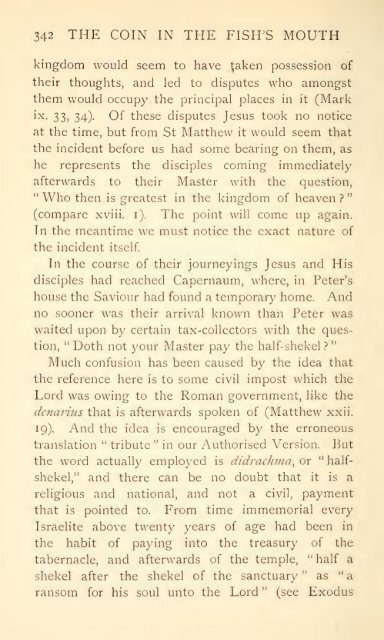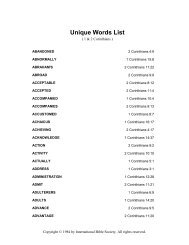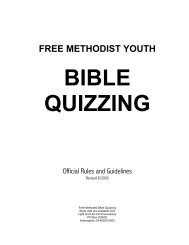- Page 1 and 2:
NYPL RESEARCH LIBRARIES 3 3433 0795
- Page 3:
\/{lr>
- Page 7 and 8:
THE MIRACLES OF JESUS BY THOMAS G.
- Page 9 and 10:
CONTENTS PAGE i. The Place of Mirac
- Page 11 and 12:
CONTENTS vii PAGB 1 8. The Walking
- Page 13:
THE PLACE OF MIRACLES IN THE GOSPEL
- Page 16 and 17:
4 THE PLACE OF MIRACLES and to all
- Page 18 and 19:
6 THE PLACE OF MIRACLES perform. An
- Page 20 and 21:
8 THE PLACE OF MIRACLES extraordina
- Page 22 and 23:
io THE PLACE OF MIRACLES " Miracles
- Page 24 and 25:
12 THE PLACE OF MIRACLES the other
- Page 26 and 27:
14 THE PLACE OF MIRACLES and fed th
- Page 29:
THE WATER MADE WINE By Rev. J. G. G
- Page 32 and 33:
20 THE WATER MADE WINE and every lo
- Page 34 and 35:
22 THE WATER MADE WINE spreads its
- Page 36 and 37:
24 THE WATER MADE WINE the source o
- Page 38 and 39:
26 THE WATER MADE WINE IV. And last
- Page 41:
THE HEALING OF THE NOBLE MAN'S SON
- Page 44 and 45:
32 THE HEALING OF I. The nobleman b
- Page 46 and 47:
34 THE HEALING OF will try Him. Lik
- Page 48 and 49:
36 THE HEALING OF crumbs. The word
- Page 50 and 51:
38 THE NOBLEMAN'S SON in that faith
- Page 53 and 54:
THE FIRST MIRACULOUS DRAUGHT OF FIS
- Page 55 and 56:
DRAUGHT OF FISHES 43 If so, the cou
- Page 57 and 58:
DRAUGHT OF FISHES 45 therefore, to
- Page 59 and 60:
DRAUGHT OF FISHES 47 it a reproach
- Page 61:
THE STILLING OF THE TEMPEST By Rev.
- Page 64 and 65:
52 THE STILLING OF THE TEMPEST ness
- Page 66 and 67:
54 THE STILLING OF THE TEMPEST old,
- Page 68 and 69:
56 THE STILLING OF THE TEMPEST III.
- Page 70 and 71:
58 THE STILLING OF THE TEMPEST Lord
- Page 73 and 74:
DEMONIACS IN THE COUNTRY OF THE GAD
- Page 75 and 76:
COUNTRY OF THE GADARENES 63 a tempe
- Page 77 and 78:
COUNTRY OF THE GADARENES 65 But to
- Page 79 and 80:
COUNTRY OF THE GADARENES 67 is no o
- Page 81:
THE RAISING OF JAIRUS' DAUGHTER By
- Page 84 and 85:
72 THE RAISING OF In this narrative
- Page 86 and 87:
74 THE RAISING OF " Believest thou
- Page 88 and 89:
76 THE RAISING OF spoke of His love
- Page 90 and 91:
78 THE RAISING OF to raise the dead
- Page 92 and 93:
80 RAISING OF JAIRUS' DAUGHTER to u
- Page 95 and 96:
TOUCHING THE BORDER OF CHRIST'S ROB
- Page 97 and 98:
OF CHRIST'S ROBE 85 in each case, a
- Page 99 and 100:
OF CHRIST'S ROBE 87 ous—and when
- Page 101 and 102:
was infinitely OF CHRIST'S ROBE 89
- Page 103 and 104:
OF CHRIST'S ROBE 91 love. There wil
- Page 105 and 106:
OF CHRIST'S ROBE 93 The Church of t
- Page 107:
BLESSINGS PROPORTIONED TO FAITH The
- Page 110 and 111:
98 BLESSINGS PROPORTIONED cure, the
- Page 112 and 113:
ioo BLESSINGS PROPORTIONED seen or
- Page 114 and 115:
102 BLESSINGS PROPORTIONED has fait
- Page 116 and 117:
104 BLESSINGS PROPORTIONED that any
- Page 118 and 119:
106 BLESSINGS PROPORTIONED expectan
- Page 120 and 121:
108 BLESSINGS PROPORTIONED TO FAITH
- Page 123 and 124:
HEALING OF THE SICK OF THE PALSY Th
- Page 125 and 126:
SICK OF THE PALSY 113 Here was a ma
- Page 127 and 128:
SICK OF THE PALSY 115 selves. He ma
- Page 129 and 130:
SICK OF THE PALSY 117 olden time, w
- Page 131:
SICK OF THE PALSY 119 big and grand
- Page 135 and 136:
THE CLEANSING OF THE LEPER Matthew
- Page 137 and 138:
THE CLEANSING OF THE LEPER 125 too
- Page 139 and 140:
THE CLEANSING OF THE LEPER 12; to b
- Page 141 and 142:
THE CLEANSING OF THE LEPER 129 Jesu
- Page 143:
THE HEALING OF THE CENTURION'S SERV
- Page 146 and 147:
134 THE HEALING OF are justified in
- Page 148 and 149:
.:c" much : 13 THE HEALING OV lyte,
- Page 150 and 151:
138 THE HEALING OF inferior, can th
- Page 152 and 153:
HO HEALING THE SERVANT considering.
- Page 155 and 156:
THE DEMONIAC IN GOGUE AT CAPERNAUM
- Page 157 and 158:
SYNAGOGUE AT CAPERNAUM 145 spirit o
- Page 159:
SYNAGOGUE AT CAPERNAUM 147 So, too,
- Page 163 and 164:
CHRIST THE HEALER Peter's Wife's Mo
- Page 165 and 166:
CHRIST THE HEALER 153 narrated in t
- Page 167 and 168:
CHRIST THE HEALER 155 in the synago
- Page 169 and 170:
CHRIST THE HEALER 157 Lazarus is de
- Page 171 and 172:
CHRIST THE HEALER 159 under the sup
- Page 173:
CHRIST THE HEALER 161 know of no wo
- Page 177 and 178:
THE WIDOW'S SON Luke vii. 11-17. Le
- Page 179 and 180:
THE WIDOW'S SON 167 be different. G
- Page 181 and 182:
THE WIDOW'S SOX 169 glimpse we get
- Page 183 and 184:
THE WIDOW'S SON 171 Now I want you
- Page 185 and 186:
THE WIDOW'S SON 173 kindles the sol
- Page 187:
REPEATED SIN AND INTENSIVE PUNISHME
- Page 190 and 191:
178 REPEATED SIN AND that in the ca
- Page 192 and 193:
180 REPEATED SIN AND much talked of
- Page 194 and 195:
182 REPEATED SIN AND of the sanctua
- Page 196 and 197:
1 84 REPEATED SIN AND He was going
- Page 198 and 199:
1 86 REPEATED SIN AND left it a cit
- Page 200 and 201:
188 REPEATED SIN AND No more cups o
- Page 202 and 203:
190 REPEATED SIN AND The Son of God
- Page 204 and 205:
192 REPEATED SIN AND for the words
- Page 206 and 207:
i 94 REPEATED SIN AND tions which w
- Page 209:
THE MIRACULOUS FEEDING OF FIVE THOU
- Page 212 and 213:
200 THE MIRACULOUS FEEDING on the S
- Page 214 and 215:
202 THE MIRACULOUS FEEDING so ordai
- Page 216 and 217:
204 THE MIRACULOUS FEEDING IV. The
- Page 218 and 219:
206 THE MIRACULOUS FEEDING truly co
- Page 221:
WALKING ON THE SEA By Rev. Principa
- Page 224 and 225:
212 WALKING ON THE SEA escaped from
- Page 226 and 227:
214 WALKING ON THE SEA I. That ther
- Page 228 and 229:
216 WALKING ON THE SEA sound ; but
- Page 230 and 231:
218 WALKING ON THE SEA we do so we
- Page 232 and 233:
220 WALKING ON THE SEA dreaded was
- Page 234 and 235:
222 WALKING ON THE SEA are ready to
- Page 237 and 238:
THE MAN BORN BLIND The Witness of E
- Page 239 and 240:
THE MAN BORN BLIND 227 whence He is
- Page 241 and 242:
THE MAN BORN BLIND 229 medicine, or
- Page 243 and 244:
THE MAN BORN BLIND 231 things which
- Page 245:
THE WITHERED HAND By Rev. ALFRED RO
- Page 248 and 249:
236 THE WITHERED HAND hurrying over
- Page 250 and 251:
238 THE WITHERED HAND world medicin
- Page 252 and 253:
240 THE WITHERED HAND question, " I
- Page 254 and 255:
242 THE WITHERED HAND III. The Sign
- Page 256 and 257:
244 THE WITHERED HAND Like this man
- Page 259 and 260:
THE TOUCH OF JESUS The Woman with a
- Page 261 and 262:
THE TOUCH OF JESUS 249 horrifying,
- Page 263 and 264:
THE TOUCH OF JESUS 251 at Bethsaida
- Page 265 and 266:
THE TOUCH OF JESUS 253 That is an e
- Page 267 and 268:
THE TOUCH OF JESUS 255 the Apostles
- Page 269:
THE TOUCH OF JESUS 257 the earth, w
- Page 273 and 274:
THE HEALING OF THE MAN WITH THE DRO
- Page 275 and 276:
MAN WITH THE DROPSY 263 dilemma. Th
- Page 277:
THE HEALING OF THE TEN LEPERS By Re
- Page 280 and 281:
268 THE HEALING OF I. "Watermarks"
- Page 282 and 283:
270 THE HEALING OF little thinking
- Page 284 and 285:
272 THE HEALING OF ultimately clean
- Page 286 and 287:
274 THE HEALING OF " from the Fathe
- Page 288 and 289:
276 THE HEALING OF This is why Jesu
- Page 291:
FAITH TRIUMPHANT OVER HINDRANCES Th
- Page 294 and 295:
282 FAITH TRIUMPHANT towards the dr
- Page 296 and 297:
284 FAITH TRIUMPHANT nature, of man
- Page 298 and 299:
286 FAITH TRIUMPHANT chilling answe
- Page 300 and 301:
288 FAITH TRIUMPHANT measure upon o
- Page 302 and 303:
290 FAITH TRIUMPHANT cried, " Send
- Page 305 and 306: THE HEALING OF THE DEAF AND DUMB Ma
- Page 307 and 308: THE DEAF AND DUMB 295 those young p
- Page 309 and 310: THE DEAF AND DUMB 297 and idle, if
- Page 311 and 312: THE DEAF AND DUMB 299 II. Let us th
- Page 313 and 314: THE DEAF AND DUMB 301 wept over the
- Page 315: THE DEAF AND DUMB 303 more say, " E
- Page 319 and 320: THE FEEDING OF THE FOUR THOUSAND Ma
- Page 321 and 322: THE FOUR THOUSAND 309 so, anticipat
- Page 323: THE FOUR THOUSAND 311 let us rememb
- Page 327 and 328: THE OPENING OF THE EYES OF ONE BLIN
- Page 329 and 330: OF ONE BLIND AT BETHSAIDA 317 speci
- Page 331 and 332: OF ONE BLIND AT BETHSAIDA 319 men a
- Page 333 and 334: OF ONE BLIND AT BETHSAIDA 321 sight
- Page 335 and 336: OF ONE BLIND AT BETHSAIDA 323 easie
- Page 337 and 338: OF ONE BLIND AT BETHSAIDA 325 man i
- Page 339: OF ONE BLIND AT BETHSAIDA 327 we kn
- Page 343 and 344: THE DEMONIAC The Saving Power of Ha
- Page 345 and 346: THE DEMONIAC 333 the work. And ther
- Page 347 and 348: THE DEMONIAC 335 half-ashamed, feel
- Page 349 and 350: THE DEMONIAC 337 tuary. Take somebo
- Page 351: THE COIN IN THE FISH'S MOUTH By Rev
- Page 356 and 357: 344 THE COIN IN THE FISH'S MOUTH An
- Page 358 and 359: 346 THE COIN IN THE FISH'S MOUTH Hi
- Page 361 and 362: THE RESURRECTION AND THE LIFE Chris
- Page 363 and 364: AND THE LIFE 351 ship was cold and
- Page 365 and 366: AND THE LIFE 353 say to His discipl
- Page 367 and 368: AND THE LIFE 355 during the life of
- Page 369 and 370: AND THE LIFE 357 paring her for the
- Page 371 and 372: AND THE LIFE 359 desire Him—and d
- Page 373: BLIND BARTIM^US The Importunate Pra
- Page 376 and 377: 364 BLIND BARTIM/EUS knowing that J
- Page 378 and 379: 366 BLIND BARTIMjEUS qualities, spi
- Page 380 and 381: 368 BLIND BARTIM^US small corner, a
- Page 382 and 383: 370 BLIND BARTIM/EUS Ask that your
- Page 385: THE BARREN FIG-TREE By Rev. ALFRED
- Page 388 and 389: 376 THE BARREN FIG-TREE Looking at
- Page 390 and 391: 378 THE BARREN FIG-TREE profession,
- Page 392 and 393: 380 THE BARREN FIG-TREE We must not
- Page 394 and 395: 332 THE BARREN FIG-TREE amount of f
- Page 396 and 397: 384 THE BARREN FIG-TREE ment more t
- Page 399 and 400: THE MIRACLE OF REPARATION The Heali
- Page 401 and 402: THE MIRACLE OF REPARATION 389 have
- Page 403 and 404: THE MIRACLE OF REPARATION 391 decli
- Page 405 and 406:
THE MIRACLE OF REPARATION 393 and t
- Page 407 and 408:
THE MIRACLE OF REPARATION 395 quick
- Page 409 and 410:
THE MIRACLE OF REPARATION 397 swash
- Page 411 and 412:
THE MIRACLE OF REPARATION 399 does
- Page 413 and 414:
THE MIRACLE OF REPARATION 401 every
- Page 415 and 416:
THE MIRACLE OF REPARATION 403 cause
- Page 417 and 418:
THE MIRACLE OF REPARATION 405 ignob
- Page 419:
THE MIRACLE OF REPARATION 407 healt
- Page 423 and 424:
THE LAST MIRACLE The Second Miracul
- Page 425 and 426:
stood on the shore. THE LAST MIRACL
- Page 427 and 428:
THE LAST MIRACLE 415 dead, in the c
- Page 429 and 430:
THE LAST MIRACLE 417 have been writ
- Page 431 and 432:
THE LAST MIRACLE 419 native resourc
- Page 433 and 434:
THE LAST MIRACLE 421 there is nothi
- Page 439:
1 Date Due





